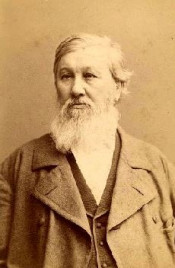
Birth of Nikolay Yakovlevich Danilevsky, Russian Philosopher, Publicist, Naturalist
Nikolay Yakovlevich Danilevsky was born on December 4 (16), 1822 in the village of Ostrov, Oryol Governorate, in a noble family. He studied at the Tsarskoye Selo Lyceum (1836-1843), and then became a free student of the Natural Department of the Faculty of Philosophy of the St. Petersburg University. In 1849, he received a master's degree in botany. During his studies, he became friends with brothers N. P. Semenov and P. P. Semenov-Tyan-Shansky. Together with the latter, on behalf of the Free Economic Society, he took part in an expedition to study the border of the black earth zone of European Russia, the physical and chemical composition of its soils and vegetation.
In 1845-1848, Nikolay Danilevsky became interested in socialist ideas and, in particular, the theories of Charles Fourier, attended the circle of M. V. Petrashevsky. In 1849, he was arrested along with other members of the circle and spent more than four months in the Peter and Paul Fortress. During his imprisonment, he abandoned liberal views and returned to his former conservative beliefs. He was exiled to Vologda, then to Samara, and was under police supervision until 1856. He served in the provincial boards of Vologda (1850-1852) and Samara (1852-1853) Governorates.
At the request of the Russian Geographical Society in 1853, Danilevsky was seconded to the expedition of K. E. Baer to study fishing on the Volga and in the Caspian Sea. After its completion in 1857, he was assigned to the Department of Agriculture of the Ministry of State Property. During his years of service (1857-1871), he led expeditions that researched fishing in European Russia. Since 1858, he was a member of the RGO, since 1862 – a member of the Scientific Committee of the Ministry of State Property, and since 1871 – a member of the Council of the Minister of State Property.
He published a number of scientific works on botany, zoology, ethnography, economics, statistics, including The Climate of Vologda Governorate (1853), Studies on the Kuban Delta (1869), Darwinism. Critical Research (Vol. 1-2, 1885-1889; not finished), and others.
The work Russia and Europe: a look on the cultural and political attitude of the Slavic world towards the Germanic-Romance (published in the Zarya magazine in 1869, issued in a separate edition in 1871, and then reprinted several times) in particular made Nikolay Danilevsky quite famous. The book rejected the generally accepted concept of the unity of world history as an evolutionary-stadial movement of a single humanity and developed the theory of “historical-cultural types” (civilizations). Danilevsky identified 13 such types in the history overall, 10 of which managed to pass their exceptional stages of development from “birth” to “flowering” (civilization) with subsequent withering. The author paid special attention to the Romano-Germanic (European) and Slavic cultural and historical types. The first of them, in his opinion, was at the “apogee of civilizational greatness” and therefore began to decline, while the Slavic type, in which Russia was given a central place, could, having overcome the “hostile” attitude of the Romano-Germanic type countries, move into the flourishing stage and take a leading place on the historical stage. In the Slavs, Nikolay Danilevsky saw the makings for the full development of all 4 types of historical activity: religious, cultural, political and socio-economic.
The ideas of Nikolay Danilevsky had both supporters (K. N. Bestuzhev-Ryumin, N. N. Strakhov, K. N. Leontiev, F. M. Dostoevsky) and opponents (V. S. Solovyov, N. I. Kareev, N. K. Mikhailovsky, P. N. Milyukov). Danilevsky’s historiosophical views forestalled the ideas of O. Spengler, A. J. Toynbee, and other Western thinkers.
Nikolay Yakovlevich Danilevsky died suddenly on November 7 (19), 1885 in Tiflis during a scientific expedition. He was buried in his Crimean estate, Mshatka.
Lit.: Балуев Б. П. Споры о судьбах России: Н. Я. Данилевский и его книга «Россия и Европа». Тверь, 2001; Данилевский Николай Яковлевич (1822–1885) // Большая российская энциклопедия; Новая философская энциклопедия. В 4-х т. / Ин-т философии РАН. Т. 1, А–Д. М., 2010. С. 582; Птицын А. Н. Концепция «славянской цивилизации» Н. Я. Данилевского. Ставрополь, 2003.
Based on the Presidential Library’s materials:

